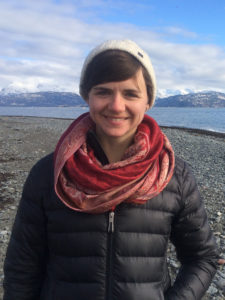In Their Words: Vivian Underhill
Name: Vivian Underhill
Department: Feminist Studies
What Scholarship or Award did you receive? Hammett Fellowship
What year are you (1st year, 3rd year)? 3rd year
College: Graduate Division
Where do you call home? I was born and raised in Boulder, Colorado.
What is your field of focus? My work brings together feminist studies, critical race theory, and groundwater hydrology.
With all of the choices for college, what made UC Santa Cruz stand out? I came here specifically because of UC Santa Cruz’ feminist studies faculty. In addition, the feminist studies program’s openness to interdisciplinary projects was really important to me.
What do you hope to do once you graduate from UC Santa Cruz? I hope to continue to research, write, and teach about the intersections of environmental and social issues, whether that’s as a professor or in the private sector.
What is one memorable moment that stands out for you as a student here? My first position as a teaching assistant was in a course that addressed feminism, embodiment, and environmental crisis – specifically nuclear waste and disaster. It was a rewarding experience to mentor undergraduates, and it also helped me think through my own research more thoroughly.
How will this scholarship/award impact your academic life/research? My research requires my in-person presence at sites of fracking and groundwater hydrology research around California and Colorado. My department’s funding mechanisms are based on TA-ships, and this scholarship makes it possible for me to be in the field for a quarter, rather than on campus. It makes a major portion of my dissertation research possible.
For research awards, please include a one paragraph description of your research written for a general audience. My research focuses on the sociocultural dynamics of fracking’s impacts on groundwater in the San Joaquin Valley. This water is already highly contaminated with a range of pollutants from large-scale agriculture, which disproportionately affects rural, low-income Latino communities. Now, the increase of fracking in the San Joaquin Valley, and its unique geographies, time scales, and scientific uncertainties, force new questions around land and water use, environmental justice, and public health. I combine geographic, ethnographic, and historical methods to trace how knowledge about groundwater becomes legible (or illegible) within regimes of evidence, and how those dynamics relate to fracking’s sociocultural impacts on communities within California’s hydrologic history of imperialism. First, I examine discourses around fracking and groundwater contamination through ethnographic analysis of scientific and community knowledge production. Second, I place these current questions in longer historical perspective. Water infrastructure projects were central to Spanish, Mexican, and US imperial, colonial, and settler colonial formations through the creation and settlement of ‘productive’ land. Tracing the spatialities of groundwater and oil extraction through imperial and colonial land use histories reframes groundwater as not a static and separate resource but rather as registering histories and geographies of racialized dispossession and settlement. How do these longer-scale histories of power and violence reframe the terms on which fracking and groundwater, responsibility and accountability, are discussed?

Department: Feminist Studies
What Scholarship or Award did you receive? Hammett Fellowship
What year are you (1st year, 3rd year)? 3rd year
College: Graduate Division
Where do you call home? I was born and raised in Boulder, Colorado.
What is your field of focus? My work brings together feminist studies, critical race theory, and groundwater hydrology.
With all of the choices for college, what made UC Santa Cruz stand out? I came here specifically because of UC Santa Cruz’ feminist studies faculty. In addition, the feminist studies program’s openness to interdisciplinary projects was really important to me.
What do you hope to do once you graduate from UC Santa Cruz? I hope to continue to research, write, and teach about the intersections of environmental and social issues, whether that’s as a professor or in the private sector.
What is one memorable moment that stands out for you as a student here? My first position as a teaching assistant was in a course that addressed feminism, embodiment, and environmental crisis – specifically nuclear waste and disaster. It was a rewarding experience to mentor undergraduates, and it also helped me think through my own research more thoroughly.
How will this scholarship/award impact your academic life/research? My research requires my in-person presence at sites of fracking and groundwater hydrology research around California and Colorado. My department’s funding mechanisms are based on TA-ships, and this scholarship makes it possible for me to be in the field for a quarter, rather than on campus. It makes a major portion of my dissertation research possible.
For research awards, please include a one paragraph description of your research written for a general audience. My research focuses on the sociocultural dynamics of fracking’s impacts on groundwater in the San Joaquin Valley. This water is already highly contaminated with a range of pollutants from large-scale agriculture, which disproportionately affects rural, low-income Latino communities. Now, the increase of fracking in the San Joaquin Valley, and its unique geographies, time scales, and scientific uncertainties, force new questions around land and water use, environmental justice, and public health. I combine geographic, ethnographic, and historical methods to trace how knowledge about groundwater becomes legible (or illegible) within regimes of evidence, and how those dynamics relate to fracking’s sociocultural impacts on communities within California’s hydrologic history of imperialism. First, I examine discourses around fracking and groundwater contamination through ethnographic analysis of scientific and community knowledge production. Second, I place these current questions in longer historical perspective. Water infrastructure projects were central to Spanish, Mexican, and US imperial, colonial, and settler colonial formations through the creation and settlement of ‘productive’ land. Tracing the spatialities of groundwater and oil extraction through imperial and colonial land use histories reframes groundwater as not a static and separate resource but rather as registering histories and geographies of racialized dispossession and settlement. How do these longer-scale histories of power and violence reframe the terms on which fracking and groundwater, responsibility and accountability, are discussed?
